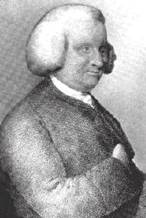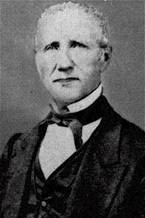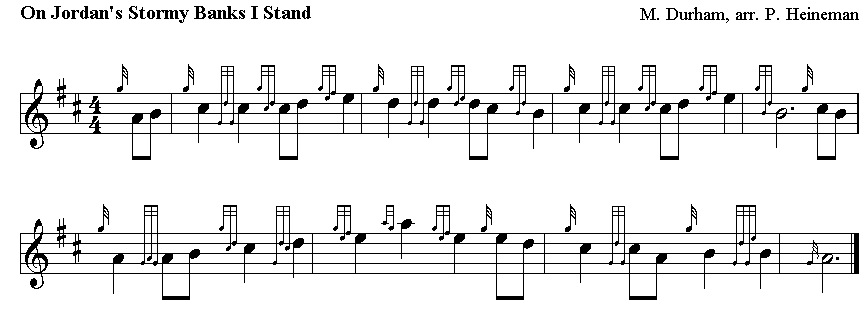 |
|||||||

Best viewed in
|
On Jordan's Stormy Banks I Stand
More than any other of Samuel Stennett's hymns, "On Jordan's Stormy Banks", which was published in Rippon's Selection under the title "Promised Land," found enormous popularity especially amongst 19th-century American Methodists. It was sung in camp meetings and brush arbors, and also found its way into the 1835 Southern Harmony and is part of the American shape note tradition. Several of Stennett's hymns are preserved in the Sacred Harp.
The music was
written by Miss M. Durham, and published in The
Southern Harmony and Musical Companion, by William
Walker.
William Walker (May
6, 1809 –
September 24, 1875)
was a Baptist song leader, shape note "singing master", and compiler of
four shape note tunebooks.
He was born in Martin's Mills (near
Cross Keys), South Carolina, and grew up near Spartanburg.
Musically gifted, by age 18 Walker was leading congregational
singing at the First Baptist Church in Spartanburg. He collected
and arranged folk tunes, and with his brother-in-law, Benjamin
Franklin White, participated in singing schools and compiling
melodies from southern Appalachia and camp meetings. After
moving to Hartford, Connecticut, Walker published
The Southern Harmony and Musical Companion
in 1835.
This collection was revised in 1840, 1847 and
1854. In 1846 he issued The Southern and Western Pocket Harmonist.
Intended as an appendix to the Southern Harmony, the Pocket Harmonist
contains a large number of camp-meeting songs with refrains. In 1867
(preface signed October 1866), Walker published a tunebook entitled
Christian Harmony, in which he adopted a seven shape notation. He
incorporated over half of the contents of The Southern Harmony in
the Christian Harmony, and he added alto parts to those pieces
which had lacked them before. For the additional three shapes, Walker
devised his own system - an inverted key-stone for "do", a quarter-moon
for "re", and an isosceles triangle for "si" (or "ti"). Walker issued an
expanded edition of Christian Harmony in 1873. In the same year, he
brought out a collection of Sunday school songs entitled Fruits and
Flowers. Two of Walker's tunebooks remain in print. Facsimiles of his Southern Harmony (1854 edition) continue in use at an annual singing in Benton, Kentucky. His Christian Harmony remains current in two editions: a facsimile reprint of the 1873 edition, and a revision by O.A. Parris and John Deason first published in 1958, employing the more familiar note-shapes of Jesse B. Aiken. Walker's compositions and arrangements are widely sung today by Sacred Harp singers as well as others. His work is represented by 13 songs in the current 1991 "Denson" edition of The Sacred Harp, and by 12 in the "Cooper" edition. According to the collated minutes kept by the Sacred Harp Musical Heritage Association, his song "Hallelujah" is sung at Sacred Harp conventions more than any other. The Walker songs are generally sung in four-part versions, with alto parts added by early 20th century composers.
Lyrics by Samuel Stennett
|
||||||


